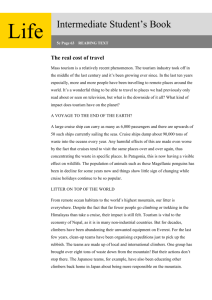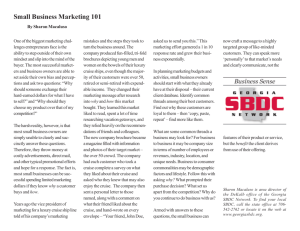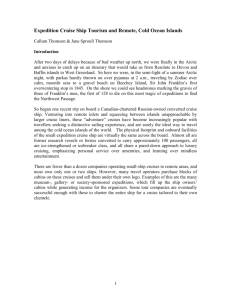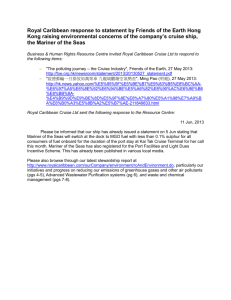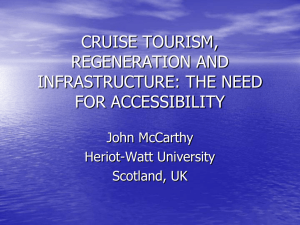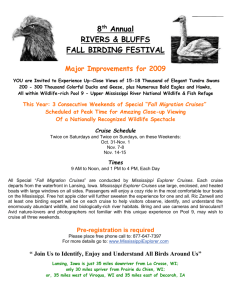Cruise Tourism Event Management
advertisement
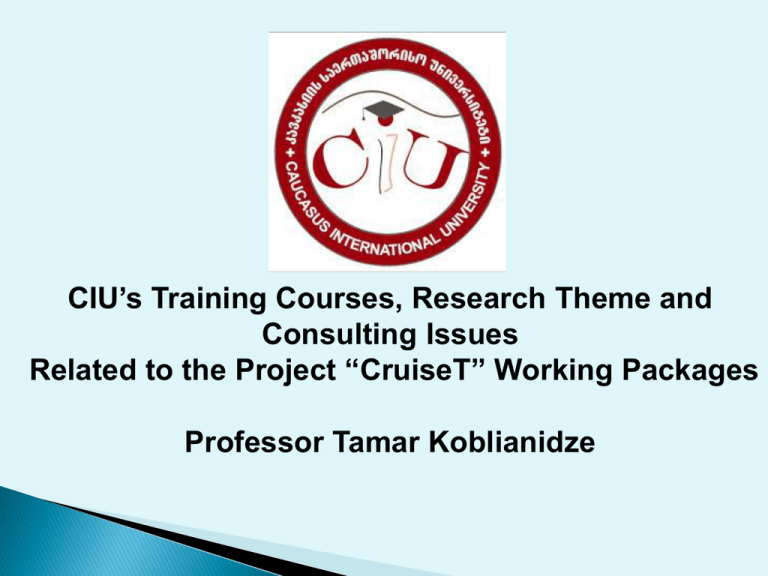
CIU’s Training Courses, Research Theme and Consulting Issues Related to the Project “CruiseT” Working Packages Professor Tamar Koblianidze •WP3: “Trainings” During 2014 CIU project team finished I cycle of Research “Tourism Companies needs analyze -deepening of the "Training" topics“. Research is based on Company’s survey (using questionnaires, round tables results, inquiry, telephone-mail and interview). According to the company’s needs analyze and decision of project team CIU, offered courses are: 1. Strategic management for Tourism (Total N of Themes: 10 Ready: 4) - Prof. Dr. Tamar Koblianidze. 2. Art of service in Cruise tourism (Total N of Themes: 9 Ready 5) - Prof. Dr. Elisabed Malania 3. Food and Beverage Quality Management in Cruise Tourism (Total N of Themes: 5 Ready 2) - Prof. Dr. Lia Berikashvili Ready: 4 themes 1. Introduction to course and topics (basic terminology) Overall Aims of Strategic Management: Creating a Competitive Advantage -15 hours 2. The strategic management process/strategic thinking (i.e. situation analysis, strategic direction, strategy formulation, strategy implementation) -15 hours 3. The origin of strategic management (e.g. resource-based view) -15 hours 4. Variables affecting global competitiveness in the hospitality industry 15hours Literature(References): Hospitality Strategic Management: Concepts and Cases, Enz; Strategic Management for Hospitality and Tourism Fevzi Okumus, Levent Altinay, Prakash Chathoth Professor Elisabed Malania Total N of Themes: 9 Ready 5 1. The role of service of clients (consumers) in cruise tourism. – 15 hours 2. Consumers (tourists) Behavior in cruise tourism and their motivation -15 hours 3. The cruise tourism product, market and features.10 hours 4. The cruise tourists normative documents.-5 hours 5. Cruise tourist service quality-15 hours Quality is the basic characteristic of product, which plays drastic role in customer demand and formation product’s competitiveness. Demand is established during the process of product design, production, storage and realization. Studying of product’s customer value means studying of its quality. Products‘ quality rating is quanitative characteristic of quality. There are independent, complex, basic and determinant ratings of quality, “Success Strategies and Modern Aspects of Quality Management in Cruise Tourism” Quality Management has increasingly important role in modern society.The word is rapidly changing. What is good, or even “the best” today will probably not be very good tomorrow and completely unacceptable in a more distant future. The research topic about TQM, appraise, design, implement and evaluate future orientated plans for interacting with competitive environments from the perspective of tourism and hospitality related organisations and destinations. it gives us understanding of current strategic thinking and practice which identifies corporate success, excellence, and strategic leadership to contribute to decision making in the tourism and hospitality business arena. The main objective of this research is to investigate and develop methods of quality control , procedures, and technologies, which are applicable to strategic development of tourism firms, NTO or DMO. This aspect of research is new challenge for Georgian Academic Sphere. We consider this theme, as one of the tools, which can make an important contribution towards development of tourism industry. Main research topics are: Rationale for Quality Management in the Cruise Tourism Industry and Define of Quality Terms The Significance of Quality in Modern Tourism Development and Social Aspects of Quality Management in Tourism. Quality Management Systems and TQM Philosophy; TQM Concept for Cruise Tourism Economic Entities (in a destination areas) Support stakeholders’ measure and improve their development throw competence center; Understand Business challenges in tourism and hospitality sectors Provide Sustainable economic growth in tourism and hospitality; Evaluation of Quality strategy Design and Create the research basis for academic learning Module “Tourism Quality Mamagement” for Master Programs: “Destination Management” / Cruise Tourism Management PROFILE OF THE CRUISE TRAVELLER WHY PEOPLE CRUISE • It’s easy to meet people and make friends on a cruise • Cruise lend themselves to groups • A cruise is a romantic experience • A cruise is a learning experience • There is a cruise that virtually satisfy anyone • It is a great way to celebrate a special occasion or event • Everybody is talking about how wonderful cruising is • Cruises represents a safe travel experience • It is great value for the money • You know what you are paying for in advance PROFILE OF THE CRUISE TRAVELLER WHO BUY CRUISES ? • Restless Baby Boomers (33%) They are in their 40s & 50s, family oriented, looking for value, thrifty and likes the cost saving value of a cruise • Enthusiastic Baby Boomers (20%) A little younger (early 40s) than the above category, adventurous, fun loving & family-oriented, the romantic experience appeals to them, see cruises as an entertaining way to meet many people • The Consummate Shoppers (16%) Well travelled, 55 and above, like the pampering and the fine dining, the ship is as important to them as the destination, thrifty and looking for best deal for their money WHO BUY CRUISES • Luxury Cruisers (14%) Values ships that offer fine dining, pampering, money is not an issue as long as they perceive good value,, cultured, well educated, experience and active, average age - 52 • Explorer (11%) They see a cruise as a means to discover the world, destinations are far more important than the ship itself, well educated and use their sightseeing to learn more, older (average 64) but still active, plans their cruise well ahead of time- not for the “early bird” discount but to make sure they have the desired cruise • Ship Buffs (6%) Most cruise savvy ,they have an unusual knowledge of ships and itineraries, like longer cruises, average age is 68 PROFILE OF THE CRUISE TRAVELLER There are many categories of existing and potential cruisers such as families, couples, honeymooners, people celebrating anniversaries, singles… ON A SHORTER CRUISE THEY TEND TO BE • Younger • New to cruising • Have more modest income • Have less education • Likely to work full-time • More interested in massmarket destinations such as Caribbean ON A LONGER CRUISE THEY TEND TO BE • Older • Have high incomes • Likely to be more educated • Likely to be semi retired or retired • Have more interest in exotic destinations like South America • Have already experienced cruising
